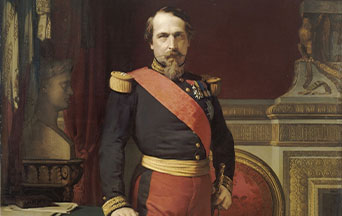
The assassination of Paris Archbishop Marie-Dominique-Auguste Sibour in 1857 and the failure of the pamphlet, L’Univers jugé par lui-même completely changed the nature of the offensive against Veuillot and his newspaper, l’Univers. Its enemies understood that doctrinal disputes would not achieve their goals. For his part, the new Cardinal Archbishop, François-Nicholas-Madeleine Morlot, did not support l’Univers but kept strictly neutral. When taking possession of the archdiocese, he even assured Louis Veuillot he would never be among the paper’s adversaries.
By 1857, L’Univers had attained a secure and independent situation. It was the undisputed leader and the envy of the French Catholic movement. Its finances stabilized when Eugene Taconet bought all shares of the joint-stock company that owned the newspaper, thus making the journal his property. Although a businessman concerned about the commercial fate of l’Univers, Taconet unconditionally supported its editor-in-chief. But while the newspaper prospered economically, and the struggle among Catholics had calmed down, political persecution was looming ever more clearly.
Catholics had supported Napoleon III’s 1851-1852 coup d’état. The upstart Emperor began his reign by giving all kinds of material help to the Church in France. Additionally, his foreign policy was favorable to the Holy See. He supported the Holy Father against the Carbonari, Italian revolutionaries seeking to unify the Peninsula at any price.
Eternal and Natural Law: The Foundation of Morals and Law
However, Napoleon III’s relationship with the Italian movement was complicated. In 1831, long before becoming a prominent French political figure, he fought alongside the Carbonari against the Austrian and Papal governments. As a former Carbonaro, the Emperor’s policy toward the Italian situation was always equivocal. His former companions would not allow even his relative goodwill toward the papacy. They attacked him and demanded that he fulfill his youthful promises to Carbonari.1
At the same time, Louis Napoleon could not make a sudden turnaround. He had to prepare the ground carefully. After all, most Catholics had supported his ascension to the throne. Napoleon III could not make obvious moves against Pius IX, which would run roughshod over powerful Catholic interests. Led by Veuillot, lay Catholic opinion was very powerful.
From the exclusively political point of view, Catholics were divided into three main currents. The most influential broadly supported Napoleon III. However, they reserved the right to withdraw their backing if the Emperor turned against the Holy See. These were the “exclusively Catholic Catholics,” led by Louis Veuillot. Next came the so-called “governmental Catholics,” who regarded Napoleon III as a national savior. Finally came liberal Catholics who were frankly hostile to the regime. They were a conglomeration of liberals of all tendencies, to whom the Count of Montalembert gave a Catholic veneer. Their mouthpiece was the Correspondant.
For the Emperor, Montalembert did not pose a severe problem. Once the head of the Catholic party, the Count’s inner struggle between liberalism and Catholicism increasingly transformed him from a son of crusaders into an uncompromising liberal. A one-time traditionalist, Montalembert’s new liberal contradictions discredited him and limited his influence. The coup de grâce was not long in coming. During a debate on Indian affairs in the English Parliament, Montalembert published an article in the Correspondant in which his liberal persona completely suffocated the Catholic one. Seizing the opportunity, Napoleon III tested Montalembert’s support. The Count emerged as a genuine advocate of liberalism. All doubts were dispelled. Montalembert was definitively removed from Catholic circles. He would henceforth be a liberal chief seeking to reconcile Catholicism with liberalism. He was, therefore, a liberal-and not a Catholic-opponent of the government.
 Learn All About the Prophecies of Our Lady of Good Success About Our Times
Learn All About the Prophecies of Our Lady of Good Success About Our Times
With l’Univers, things were much more complicated. It was useless to try to change Louis Veuillot’s conduct or to demoralize him. The government’s supporters tried to buy the newspaper. Taconet refused to sell. So, the liberals tried to split up Veuillot’s editorial staff. One of the editors, Jules Gondon, accepted the liberals’ offer. As a reward, he was charged to direct a new daily that intended to draw l’Univers’s readers to the government’s side.
Initially, the new paper was to toe the same line as l’Univers. Then, it would gradually transform itself to support the government’s policies. The Interior Minister, Adolphe Billault, suggested L’Universel, a name quite similar to that of Veuillot’s newspaper, in hopes of adding to the confusion. Gondon’s new staff distributed propaganda leaflets to sell the new paper and its first issues appeared, but it was an utter debacle. L’Universel failed to get any readers, and the government was forced to close it.
This defeat for Napoleon III made it clear that French Catholics supported l’Univers. The government had no doubt that Veuillot would be the great opponent of any policy friendly to the Italian Revolutionaries the government might adopt. For the newspaper, a new phase in its life was about to begin.

